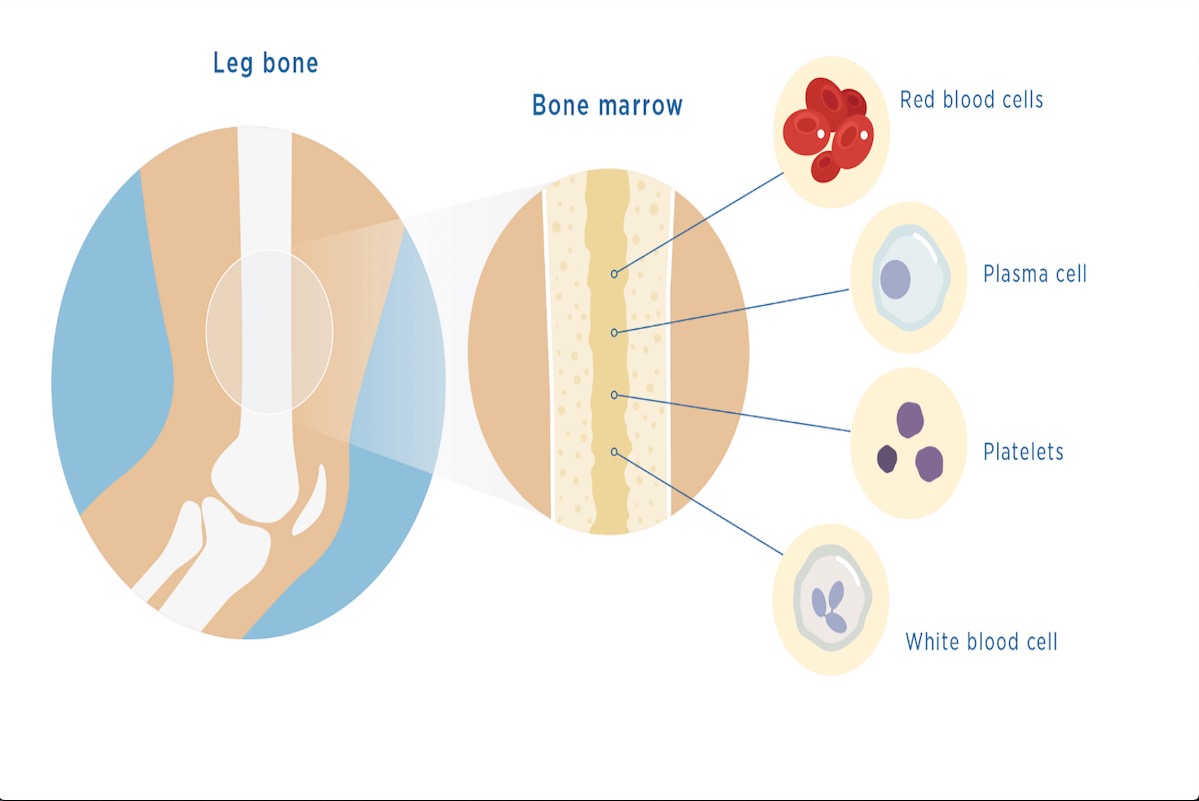Cancer can affect various parts of the body, and the blood is no exception. Specifically, plasma cell cancers are a type of blood cancer that impact the plasma cells located in the bone marrow. These types can cause a wide range of symptoms that have a significant impact on a person’s quality of life. Unfortunately, many Americans are diagnosed with plasma cell cancers each year.

It’s important to note that there are different types of plasma cell cancers. These include multiple myeloma, plasmacytoma, Waldenstrom macroglobulinemia, AL amyloidosis, and solitary bone plasmacytoma. Each have their unique characteristics, symptoms, and treatment options. Understanding these details is crucial in recognizing the signs of plasma cell cancers early on, which can improve the chances of successful treatment and better overall outcomes.
What Is Bone Marrow?
Before we delve into the topic of plasma cell cancers, it’s important to first understand the role of bone marrow in our body. Bone marrow, a spongy tissue inside our bones, is made up of various types of cells, including blood stem cells and plasma cells. Blood stem cells have the ability to develop into different types of blood cells, including red blood cells, white blood cells, and platelets.
These blood cells are essential for various bodily functions such as carrying oxygen, fighting off infections, and blood clotting. Among these cells are plasma cells, a type of white blood cell that produces antibodies to combat harmful pathogens. Ensuring a healthy bone marrow is important because it produces new blood cells necessary for maintaining our immune system’s functionality.
Multiple Myeloma
When it comes to discussing plasma cell cancers, multiple myeloma is a particular type that affects the plasma cells found in the bone marrow. This condition arises when abnormal plasma cells start to accumulate and form tumors, which can subsequently result in a wide range of issues such as bone pain, fractures, and other complications. As a result, multiple myeloma can also lead to anemia, kidney damage, and other health problems that can significantly impact one’s wellbeing. If you’re looking for more information on this type of plasma cell cancer, be sure to check out the following article: Multiple Myeloma: Risk Factors, Symptoms & Treatments
Plasmacytoma
Plasmacytoma is a type of cancer that is similar to multiple myeloma, but it is usually localized to a single bone or a soft tissue. It can occur in any part of the body, but it is most common in the spine, skull, or pelvis. Unlike multiple myeloma, which affects multiple bones, plasmacytoma is generally confined to one body area.
Waldenstrom Macroglobulinemia
Waldenstrom macroglobulinemia is a type of non-Hodgkin’s lymphoma that affects plasma cells in the bone marrow. It is characterized by the overproduction of a protein called IgM, which can cause symptoms such as fatigue, weakness, and bleeding. Unlike multiple myeloma, which can cause bone pain and fractures, Waldenstrom macroglobulinemia does not typically involve the formation of tumors in the bone marrow.
AL Amyloidosis
This is a rare disease that occurs when abnormal proteins called amyloid fibrils accumulate in organs such as the kidneys, heart, liver, and nervous system. AL amyloidosis can be caused by multiple myeloma or other plasma cell disorders. Unlike multiple myeloma, which primarily affects the bone marrow, AL amyloidosis can affect multiple organs and tissues throughout the body.
Solitary Bone Plasmacytoma
Solitary bone plasmacytoma is a rare form of plasma cell cancer that affects only one bone. While it is similar to plasmacytoma, it is even more localized and affects only one bone. It can progress to multiple myeloma, so it is important to monitor it closely.
Types of Plasma Cell Cancers
It can be confusing to understand the different types of cancers and their treatments. We have created a table that provides a simple overview of each type of plasma cell cancer, including how common it is, what symptoms you might experience, and what treatments are available. This information can be a helpful starting point in understanding your diagnosis and treatment options.
| Type of Plasma Cell Cancer | Prevalence | Common Symptoms | Treatment |
|---|---|---|---|
| Multiple Myeloma | Most common type of plasma cell cancer | Bone pain, fractures, anemia, kidney damage | Chemotherapy, stem cell transplant, radiation therapy |
| Plasmacytoma | Less common than multiple myeloma | Localized bone pain, soft tissue swelling | Radiation therapy, surgery |
| Waldenstrom Macroglobulinemia | Rare type of plasma cell cancer | Fatigue, weakness, bleeding | Chemotherapy, immunotherapy, targeted therapy |
| AL Amyloidosis | Rare type of plasma cell cancer | Organ damage, including kidneys, heart, and liver | Immunomodulatory drugs, chemotherapy, stem cell transplant |
| Solitary Bone Plasmacytoma | Rarest form of plasma cell cancer | Localized bone pain, swelling | Radiation therapy, surgery |
Although plasma cell cancers fall under the same category, they each have their own distinct characteristics, symptoms, and treatment methods. In light of this, if you or someone you know has received a plasma cell cancer diagnosis or are experiencing symptoms such as bone pain, fatigue, or unexplained bleeding, it’s crucial to seek medical attention. Speaking with your healthcare provider about receiving an accurate diagnosis and personalized treatment plan is vital. It’s also worth noting that there are numerous organizations that offer support and resources for those impacted by plasma cell cancers. Therefore, it’s important to take the initiative to reach out and gather more information. To start, consider checking out the resources available here:

